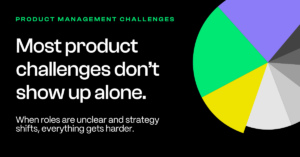
How IATA Created a Shared Product Language to Power Its Next Era of Innovation
Want a PDF version of this case study? Download Here Company Snapshot The International

How did you get into Product Management?
I grew up in Korea, and when I was young, I wanted to be a journalist. I majored in journalism but soon realized that I liked more tangible, measurable, and achievable aspirations. When I moved to Canada, I got my MBA in Marketing. My first job was as a Brand Manager at a fast-moving, consumer goods company. It was quite fun to oversee packaging and design and different types of advertising. I ran the promotions and planning with our various retailers. I eventually took a job as a Product Manager with Chemtura, a chemical company later acquired by LANXESS. This transition was quite eye opening for me. My memory of chemistry was from school, so I had a steep learning curve. Today, I am leading the team of Product Managers. Once my previous boss commended me for starting from scratch, now I own the business line. It is very exciting and rewarding to contribute and shape the business for future growth.
I have learned two important lessons in my career. One, business needs to make sense…. The second lesson is that everything is negotiable.
Any lessons learned along the way?
I have learned two important lessons in my career. One, business needs to make sense. Someone mentioned that they enjoyed working with me because I have common sense. It hit me that for all the complex business analysis, and day-to-day and long-term strategy we need to do, in the end we need common sense. Sometimes people forget or overlook it. Common sense can add more depth if you’re doing long-term planning. And common sense can help you be more flexible with short-term planning and tasks. Business is run by common sense.
The second lesson is that everything is negotiable. This is true, whether you’re dealing with your own internal teams or with customers. This reminder gives me the courage and confidence to make choices, and helps me see what kind of mitigation plan I want to have. Oftentimes people are afraid of making decisions and failing. What if this doesn’t happen? What if it goes that way? Once you know everything is negotiable, you can make changes for the better.
Product Managers are like mini-CEOs – they take ownership of their business line and are in a constant decision-making process to shape that business. They can influence the organization to reach its potential.
What do you like the most about Product Management?
There is never a dull moment. It’s an ever-changing dynamic. There are always new opportunities or new risks to factor in, which keeps me agile all the time. Under the corporate umbrella, Product Managers are like mini-CEOs – they take ownership of their business line and are in a constant decision-making process to shape that business. They can influence the organization to reach its potential. I believe that Product Managers are a key driving force to the business. This is an interesting and fantastic aspect of the job that really appeals to me.
What do you find the most challenging?
I think it depends on the industry. In the chemical industry, the challenge is that Product Managers need to oversee the entire value chain. Product Managers are required to look at every aspect – from the raw materials and production operations, to customer sales. From beginning to end, Product Managers need to understand each component of the value chain, and have a strategic mindset, so they can identify where to bring the most value to the company and the customers. That’s not easy.
What are you looking for when you’re hiring Product Managers for your team?
Regarding attitude, I believe willingness to learn is important, and having a can-do attitude and an ownership spirit. You are the mini-CEO, so you need to own your product line to make it successful. In my view, the mandatory skills are analytical and time management because we juggle so many things at the same time. Interpersonal skills are necessary because we deal with many different cross-functional teams and customers. It is also important to be a strategic thinker which is the difference between Analysts and Product Managers. Product Managers need to be strategic thinking in nature. These are the things I look for when interviewing.
…don’t be afraid of asking questions. You don’t know everything. Accept your limitations; you are not Superwoman. Utilize the experts in your organization.
What advice would you give women going into Product Management?
I have two things to share. First, don’t be afraid of asking questions. You don’t know everything. Accept your limitations; you are not Superwoman. Utilize the experts in your organization. They could be technical people, sales, supply chain, or finance. Leverage the expertise of every kind of expert you have. Your curiosity will help you learn more about the depth of the business.
Second, put yourself in another’s shoes. This will make you stronger and give you a strategic mindset with empathy. I think that’s very important. You need to be able to put yourself in someone else’s position. It could be your competitor, who owns the market share you want to steal. It could be your customers, who are always evaluating their options. It could be your senior management, who is looking for some valuable input. This will make you a more strategic, empathetic, and influential leader. This is a strength of most women: being an influential leader by adapting themselves and thinking about other positions.
Any guiding principle?
Business is a marathon. You have a long way to go. Sometimes you need to sprint, and sometimes you may trip. Get up, dust off, and do your best to finish the race. Don’t let short term risk, or a couple of failures, blind you from seeing where and how to finish your marathon. Sometimes I need to remind myself that it does not end right now or in one quarter or one year. It’s a long marathon. Do well until the end.
To read the entire series on Women in Product Management make sure to sign up for our newsletter.


Want a PDF version of this case study? Download Here Company Snapshot The International

Most product teams don’t fail because they can’t ship. They fail because product discovery didn’t do its job. As product managers and product leaders, we’ve all lived this

Product management feels harder than it should It’s not because teams are lazy. Not because PMs